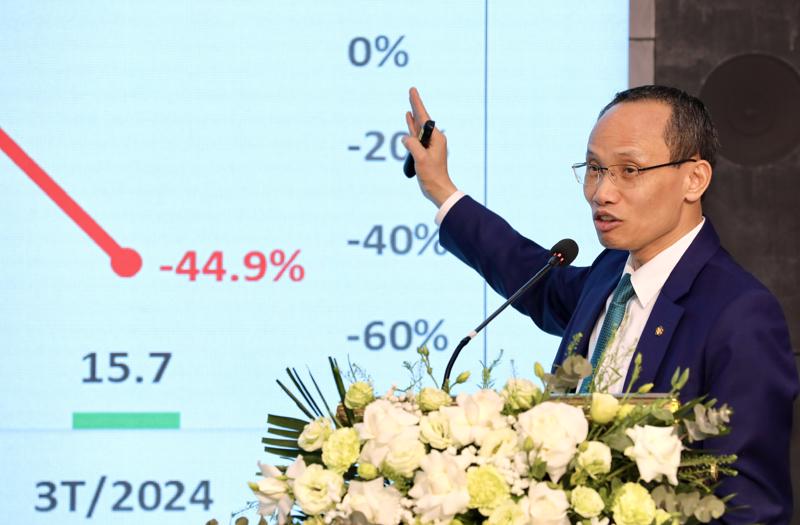Vietnam's inflation rate may reach 3.5-4% in 2024, defying the global trend of declining prices, according to economic experts. This forecast emerged during "Economic Outlook for the First Quarter: Opening the Way for the Economy in 2024," a discussion hosted by VnEconomy/Vietnam Economic Times in collaboration with the University of Economics and Business (UEB) under the Vietnam National University.
Dr. Can Van Luc, Chief Economist of BIDV bank and a member of the National Financial and Monetary Policy Advisory Council, outlined the factors contributing to this expected rise.
Why Inflation May Increase
Dr. Luc highlighted several key drivers behind the anticipated higher inflation.
Firstly, Vietnam's positive economic development is increasing the money supply and accelerating its circulation, which naturally creates inflationary pressures.
Secondly, factors like soaring gold prices and the upcoming wage increase in July (which could boost inflation by 0.3%) are directly pushing prices upward. This trend is further exacerbated by price increases in essential sectors like healthcare, education, and electricity.
Interestingly, Vietnam's economists predict an uptick in inflation for 2024, defying the global trend of declining prices. This makes Vietnam a unique case. However, even with an expected inflation rate of 3.5-4%, it would still be relatively low compared to 2023's 3.25% level.
"While interest rates are likely to edge higher in 2024, they will likely remain below 4%, which is an acceptable level," Dr. Luc noted. "This predicted rate is still favorable compared to many other regional and global economies."
Positive Signs from Q1 2024
Despite inflationary concerns, Vietnam's economy appears to be rebounding. The World Bank forecasts 5.5% GDP growth for the nation in 2024, surpassing the regional average (though behind countries like the Philippines). This builds on the momentum of a robust 5.66% growth rate in the first quarter of 2024, a significant improvement over the 3.32% GDP growth recorded in the same period of 2023.
Key drivers of Vietnam's economy – export/import activities, investment, and consumer spending – have all recovered to a positive degree," Dr. Luc explained.
He underscored this trend with specific figures, demonstrating a robust 15.5% year-on-year surge in first-quarter import and export activities. This growth was particularly strong in exports to China (5.2%), the US (26%), and the EU (16%).
While retail sales have rebounded, they still lag behind pre-pandemic levels, Dr. Luc noted. The industrial production sector also shows signs of recovery, however, many new orders restrict companies' ability to raise prices, squeezing profit margins and potentially hinting at future challenges.
Sectors Driving Growth
Dr. Luc pinpointed agriculture, industrial production, construction, and services as the sectors currently leading the economic recovery, though growth rates vary among them. This uneven growth across sectors highlights the importance of targeted policies for balanced and sustainable development.
Room for Economic Stimulus
With Vietnam's public debt, budget deficit, and financial obligations staying within the National Assembly's targets, the government possesses fiscal flexibility for further economic stimulus measures. Dr. Luc strongly advocates for this:
"We urge the Vietnamese government to adopt stimulus packages mirroring those introduced during the COVID-19 pandemic," he stated. "Tax reductions and extensions for businesses and citizens would provide vital support, fostering faster recovery."
He also emphasized the importance of maintaining low interest rates throughout 2024, as the robust liquidity of the banking system provides space for this policy. Predictable financial costs will help businesses operate more confidently.
Opportunities for Vietnam in 2024
Dr. Luc outlined three key opportunities for Vietnam to build on its economic progress. One area involves upgrading diplomatic ties with Japan and the US, which offers significant potential for economic collaboration and investment.
Additionally, four new laws addressing land use, real estate, housing, and credit institutions are expected to positively impact the market despite taking effect in 2025. Early market response to these legislative changes has been positive.
Finally, ambitious development plans from localities like Ho Chi Minh City, Da Nang, Hai Phong, and Hanoi signal accelerated, sustainable economic development on a regional level.
Navigating Challenges, Seizing Opportunities
While Vietnam's 2024 economic outlook is largely positive, it's vital to address inflationary pressures and profit margin challenges in specific industries. The key will be a well-balanced approach – maintaining stimulus measures, nurturing key sectors, and capitalizing on new strategic relationships and internal legislation.









 Google translate
Google translate